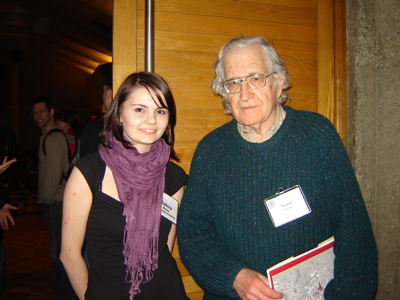Cracking the EGG

While most students look forward to long, hot summer days lounging poolside, some students see the season as an opportunity to learn more.
For the past 17 years, a small group of experts in generative grammar, a specialized field of linguistics, have held a summer school in Eastern Europe.
Each year, about 130 students spend a couple of weeks of their summer vacation, and their travel budgets, on the opportunity to attend the Eastern European Generative Grammar (EGG) and engage in lively exchange with about a dozen volunteer professors who are emerging or established experts in the field.
"I was talking with another professor there this summer who said 'the students who come here are not normal," joked Charles Reiss, a professor in the department of Classics, Modern Languages and Linguistics who attended his third EGG this year.
Oriana Kilbourn-Ceron went with Reiss and three other Concordia students to this summer's school in Constan?a, Romania on the Black Sea. She combined a visit to her father in Paris with the noncredit program. She'd heard about the EGG in Reiss's classes "he's like an ambassador for the program," and decided to apply at the last minute. "It's only 100 euros for two weeks of room and board and the school," she said.
Reiss says that the shoestring operation, held in smaller schools with participants living in dorms, is an incredible opportunity to network with those interested in the theoretical linguistics model developed by Noam Chomsky in the 1950s. The model links brain function to language acquisition suggesting that thought patterns are directly linked to syntax.

The school was started by a group of linguists who work at the University of Tromsø in Norway. They've developed this field, nanosyntax, in the last five or six years," said Kilbourn-Ceron of the unique opportunity. "It's really exciting to be part of something so new." She intends to build on the knowledge she gained at the EGG to develop her final honours project in her last year at Concordia.
"I made a lot of new friends and was able to invite one of the EGG teachers, an MIT graduate student, to come give a talk at Yale, where I am currently working on my PhD," said Sabina Matyiku, who also attended the EGG this summer.

"I've wanted to go to the EGG ever since taking my first linguistics course at Concordia, five years ago," said Matyiku. The school's presence in Romania this year allowed her to uncover her personal history as well. "It was nice to visit my grandma and childhood home as well as go to school by the sea in the same trip."
As an undergraduate, Matyiku worked with Reiss on photography and graphic design for I-Language: An Introduction to Linguistics as Cognitive Science, the book on the field he co-wrote with Daniela Isac, also of CMLL. The volume was published by Oxford University Press in 2008.
Isac and Reiss are married. They happened to meet in Hungary in 1998, the first year they both attended the EGG.